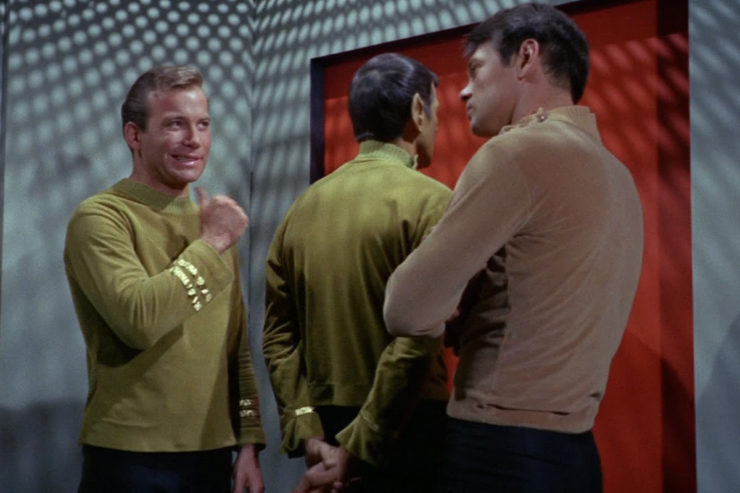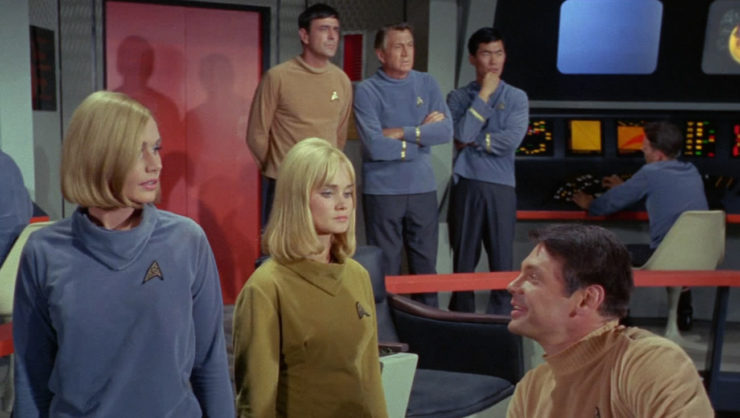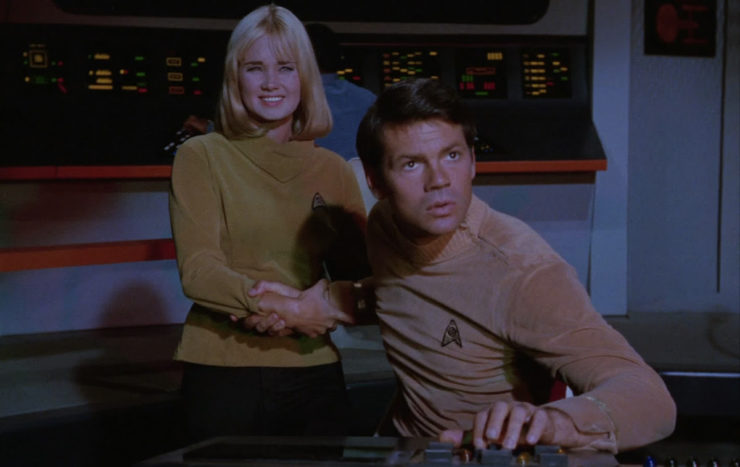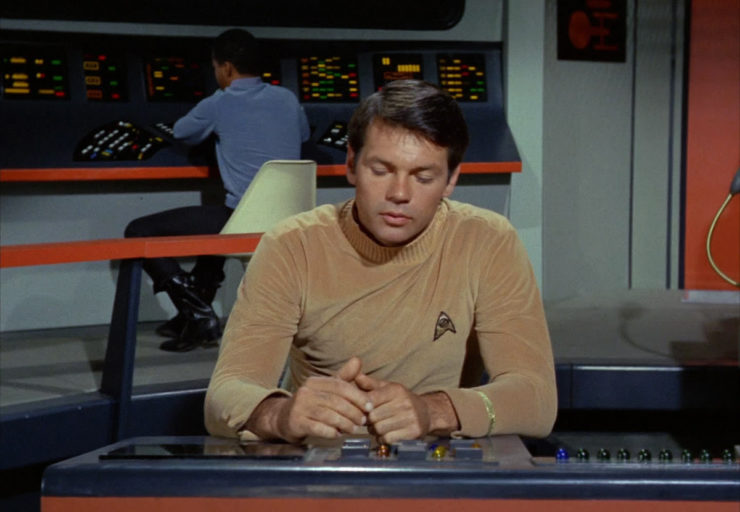I recently rewatched the two pilots for the original Star Trek, in preparation for the beginning of Strange New Worlds, the latest Trek show starring Captain Christopher Pike and the pre-Kirk crew of the USS Enterprise. And wow, I want to talk about Gary Mitchell.
The second Trek pilot, “Where No Man Has Gone Before,” is a massive improvement over the extremely clunky original pilot, “The Cage,” in every respect—except for one. Creator Gene Roddenberry was forced to get rid of Number One, the smart, resourceful, impassive second-in-command played by Roddenberry’s future wife, Majel Barrett. But in general, they got it right the second time.
William Shatner is a massive improvement over Jeffrey Hunter—and Kirk actually enjoys being captain, whereas Pike only wants to complain about how much he hates his job.The worst character in “Where No Man Has Gone Before” is introduced as if he’s going to be a series regular: Gary Mitchell, Kirk’s old friend from the academy who, we are told, has been serving alongside Kirk on the Enterprise for a few years.
When we first meet Kirk, he seems to have two friends: Spock, who appeals to Kirk’s nerdy, thoughtful side, and Mitchell, who brings out Kirk’s inner douchebag. This is shown via a pair of scenes in the opening moments. First, Kirk plays three-dimensional chess with Spock and wins by playing illogically, and then Mitchell busts in on the two of them in the turbo-lift. Mitchell asks Kirk how the game went, and Kirk does a throat-cutting motion while leering. Spock, noticeably, is uncomfortable with Mitchell right away and turns his back away from the two men.

After rewatching this second pilot, I’ve started thinking of it as Kirk’s true origin story. This is the moment that Kirk has to choose between his thoughtful side and his douchebag side, and he is finally forced to choose the better angel—as personified by Spock.
So we only meet Mitchell for a scant few minutes before he passes through the galactic barrier around the galaxy and gets turned into an omnipotent asshole. But it’s very clear that the galactic barrier didn’t make him an asshole, he already was one. He makes a big point of slouching when everybody else on the bridge sits upright—and where Kirk is professional to the point of brusqueness with an attractive young yeoman, Mitchell is clearly excited to sexually harass her. When Dr Dehner, the episode’s other major guest star, shows up, Mitchell immediately tries to hit on her, only to have her insinuate that he has a bad reputation. Mitchell then calls Dr. Dehner a “walking freezer unit,” and visibly sulks.

Here it’s important to caution that, of course, sexual harassment was not a well understood concept in 1966. And a lot of Mitchell’s behavior might have been interpreted as just being a regular red-blooded guy. At the same time, everyone else in the Enterprise crew, from Kirk on down, is depicted in a way that emphasizes their professionalism and their discipline, something that was very important to Gene Roddenberry given his police and military background. The contrast between the louche Gary and the more conscientious other crew members is pronounced and seems intentional.
When the Enterprise actually passes through the galactic barrier, everyone is on edge—so Mitchell makes a point of grabbing the attractive yeoman’s hand and holding on to it for an uncomfortably long time. Seriously, he’s got her hand for at least a minute, even when the ship is out of control and he’s supposed to be steering.

After Mitchell’s crappy apotheosis, complete with sparkle-eyes, we learn a little bit more about his relationship with Kirk. When they were at the Academy, Kirk was known for being a major brainiac who would keep you on your toes. You’d better watch out, because if you’re not studying hard, Kirk will show you up. Or something. Mitchell came up with an elaborate scheme to distract Kirk by getting a young blonde to seduce him—and Kirk almost married her! Womp womp.
The rest of the episode is about Mitchell becoming too powerful, to the point where power corrupts his already atrophied soul, and Spock keeps urging Kirk to take drastic action before it’s too late. Kirk is smart enough to recognize that Mitchell is becoming dangerous, and that his ship is in danger of winding up the same way as the SS Valiant, another ship where crewmembers became godlike beings. But the episode still plays like a conflict in which Kirk has to choose whether to follow Spock’s advice or believe in his old friend from the Academy, and Kirk seems to be slow to accept that Mitchell is a genuine threat—in part because he’s probably been cutting Mitchell slack for years.
So if I had the time and energy to write Star Trek fanfic right now, I’d be interested in writing about an alternate world where Gary Mitchell doesn’t become a space god. Instead, he just hangs around the Enterprise, acting like a creep and exerting peer pressure on Kirk to do the same. In that alternate universe, maybe Kirk and Spock never become quite as close as they do in the actual timeline. I can easily imagine that dynamic we see in the opening moments continuing—Kirk having a nice moment with Spock every now and then, which is then ruined by Gary Mitchell and his douchenozzle behavior.
Buy the Book


Dreams Bigger Than Heartbreak
Also, in that scenario, I don’t think Kirk ever gets to be as good a captain as he is in the original series. We remember Kirk fondly because he respects Spock’s intelligence (in spite of some good-natured ribbing that occasionally verges on xenophobia). The Kirk we get to know throughout the Original Series is often thoughtful and curious to a fault. He is, in fact, the overthinking turbo-nerd that Gary Mitchell tried to get rid of with a well-placed blonde seduction.
Of course, it’s also possible that Kirk and Mitchell might have had to break up in a less explicit fashion than what we see in this episode.
One final thought: In “The Cage,” Captain Pike tells us at great length about the burden of command and all the tough choices that he has to make, and it falls very flat. In “Where No Man Has Gone Before,” we see Kirk having to make a huge, terrible choice and struggle with the consequences, and it’s easy to get the sense that Kirk is feeling the weight of command in a way that he never has before. This hits home, and leaves us with a greater respect for Kirk’s willingness to do the right thing, even when it hurts. And to listen to the smart people around him—not just Spock, but the rest of his crew. This is one major reason why Star Trek‘s second pilot is so much better than its first.
This article was originally published at Happy Dancing, Charlie Jane Anders’ newsletter, available on Buttondown.
Charlie Jane Anders is the author of Victories Greater Than Death and Dreams Bigger Than Heartbreak, the first and second books in a new young-adult trilogy, along with the recent short story collection Even Greater Mistakes. She’s also the author of Never Say You Can’t Survive (August 2021), a book about how to use creative writing to get through hard times. Her other books include The City in the Middle of the Night and All the Birds in the Sky. Her fiction and journalism have appeared in The New York Times, the Washington Post, Slate, McSweeney’s, Mother Jones, the Boston Review, Tor.com, Tin House, Teen Vogue, Conjunctions,Wired Magazine, and other places. Her TED Talk, “Go Ahead, Dream About the Future” got 700,000 views in its first week. With Annalee Newitz, she co-hosts the podcast Our Opinions Are Correct.










